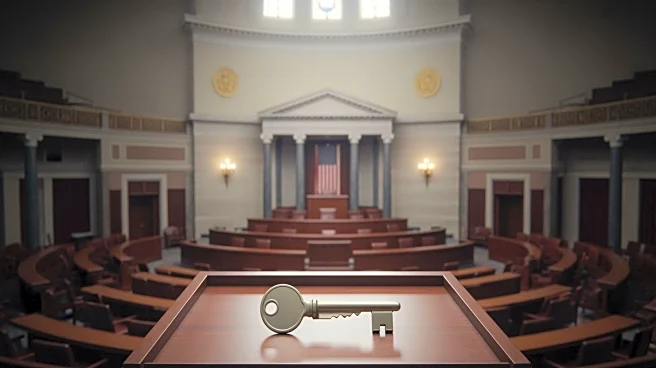What's Happening?
House lawmakers are set to return to Washington, D.C., to vote on a bill aimed at ending the longest federal government shutdown in U.S. history, which has lasted nearly eight weeks. The Senate passed the measure on Monday night, and it is expected to pass in the Republican-led
House. President Trump has described the measure as a 'very big victory.' The shutdown has caused significant disruptions, including unpaid federal workers, airport delays, and expired food assistance benefits. Speaker Mike Johnson emphasized the need for nearly perfect attendance from Republicans to ensure the bill's passage. The House has not been in session since September 19, when a short-term funding patch was passed. The current measure includes funding for three bipartisan annual spending bills and extends government funding through January 30. It also promises a future vote on extending health care subsidies, though success is not guaranteed.
Why It's Important?
The resolution of the government shutdown is crucial for restoring normal operations and alleviating the financial strain on federal workers and services. The shutdown has highlighted partisan divides, particularly over health care subsidies, which remain a contentious issue. The compromise reached in the Senate reflects a significant step towards bipartisan cooperation, though it leaves unresolved debates over health care funding. The outcome of this vote could influence public perception of both parties, especially as Democrats criticize Republicans for prioritizing other issues over immediate relief for affected citizens. The shutdown's end would also stabilize key government functions and services, providing relief to those dependent on federal programs.
What's Next?
Following the expected passage of the bill, attention will shift to the promised mid-December vote on health care subsidies. This upcoming vote will test the willingness of both parties to negotiate further on health care issues. The outcome could impact millions of Americans who rely on these subsidies for affordable health coverage. Additionally, the bill includes provisions to protect federal workers from layoffs and ensure back pay, which will be closely monitored by labor groups and federal employees. The political ramifications of the shutdown and its resolution may influence upcoming legislative priorities and electoral strategies.















